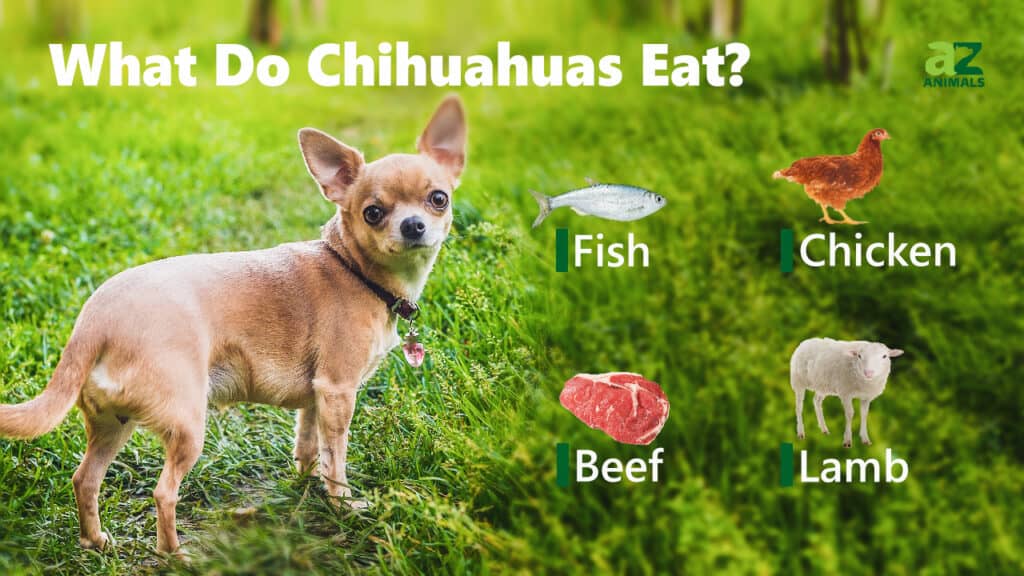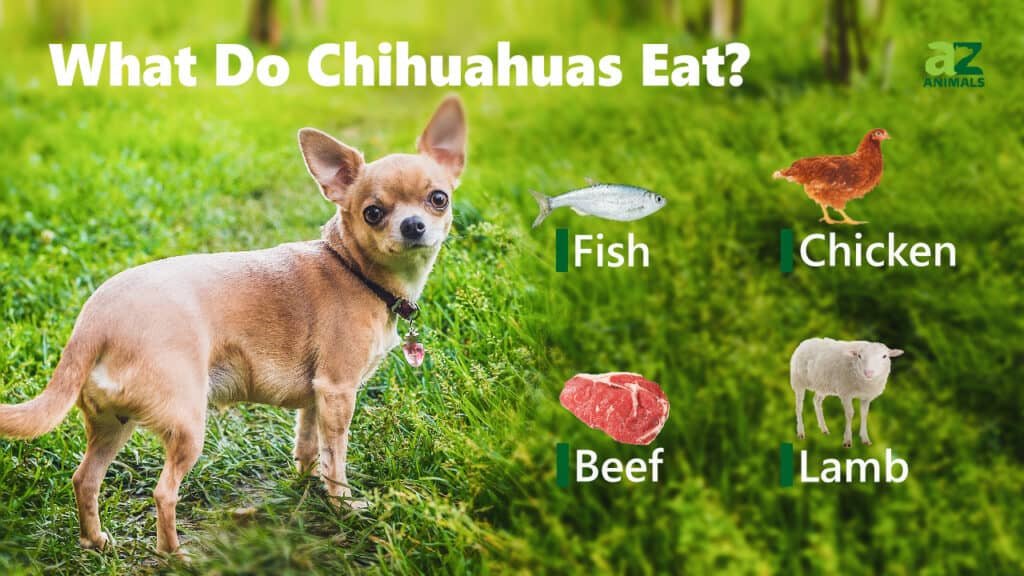As a chihuahua owner, I am often asked about what my furry friend eats. Well, did you know that chihuahuas have specialized dietary needs? Despite their small size, they require a balanced and nutritious diet to stay healthy and active.
Chihuahuas should be fed a high-quality dog food that is specifically formulated for small breeds. It should contain a good balance of protein, carbohydrates, and fats. Additionally, chihuahuas may benefit from smaller, frequent meals throughout the day, as they have a faster metabolism. It is important to avoid overfeeding, as obesity can lead to various health issues. So, feeding your chihuahua a nutritious diet and monitoring their portion sizes is crucial for their overall well-being.
When it comes to chihuahuas and their dietary needs, it’s important to understand that their metabolism and size play a significant role. Due to their tiny size, chihuahuas do not require large quantities of food. In fact, overfeeding can lead to obesity, which can increase the risk of health problems such as diabetes and joint issues. On the other hand, feeding them the right amount of high-quality dog food, along with appropriate treats, can provide them with the necessary nutrients to maintain their energy levels and support their overall health. So, it’s important to consult with a veterinarian to determine the appropriate portion sizes and types of food for your chihuahua, ensuring they lead a happy and healthy life.

What Do Chihuahuas Eat? A Complete Guide to Feeding Your Furry Friend
Welcome to our comprehensive guide on what to feed your beloved Chihuahua! As a proud Chihuahua owner myself, I understand the importance of providing the right nutrition for these small and energetic dogs. In this article, we will explore the dietary needs of Chihuahuas, including their preferred food types, portion sizes, and potential health concerns. Whether you’re a new Chihuahua owner or looking to improve your dog’s diet, this guide has got you covered.
The Importance of a Balanced Diet for Chihuahuas
Chihuahuas, just like any other dog breed, require a well-balanced diet to thrive and stay healthy. A nutritious diet is crucial for their growth, development, and overall well-being. As small dogs with high energy levels, Chihuahuas need a diet that provides them with the necessary nutrients, vitamins, and minerals in appropriate quantities.
An ideal diet for Chihuahuas should consist of high-quality protein, healthy fats, carbohydrates, fiber, and essential vitamins and minerals. It’s essential to provide a balance of all these nutrients to support their metabolism, maintain muscle mass, and support a healthy immune system.
Additionally, Chihuahuas have unique dietary requirements based on factors such as their size, age, and activity level. By understanding their specific nutritional needs, you can ensure your Chihuahua remains happy and healthy throughout their life.
What Should Be Included in a Chihuahua’s Diet?
Now that we know the importance of a balanced diet, let’s dive into the specific food types that should be included in a Chihuahua’s diet:
1. High-Quality Protein
Protein is the building block of muscles and plays a vital role in the growth and development of Chihuahuas. Opt for lean animal-based protein sources, such as chicken, turkey, fish, or beef. These proteins are highly digestible and provide essential amino acids for your dog.
2. Healthy Fats
Healthy fats are an excellent source of energy for Chihuahuas and help maintain a healthy coat and skin. Include fats from sources like salmon, flaxseed oil, and chicken fat in their diet. Avoid excessive fat intake, as Chihuahuas can be prone to weight gain.
3. Carbohydrates
Carbohydrates provide a source of energy for Chihuahuas. Opt for complex carbohydrates such as sweet potatoes, brown rice, or quinoa, which release energy slowly and help maintain stable blood sugar levels.
4. Fiber
Fiber aids in digestion and maintains a healthy digestive system in Chihuahuas. Include fiber-rich foods like vegetables, fruits, and whole grains to promote proper bowel movements and prevent constipation.
5. Essential Vitamins and Minerals
Ensure your Chihuahua’s diet includes essential vitamins and minerals such as calcium, phosphorus, vitamin A, vitamin C, and vitamin E. Consult with your veterinarian to determine if any supplements are necessary to meet your dog’s specific needs.
Feeding Guidelines for Chihuahuas
When it comes to feeding your Chihuahua, it’s essential to establish a feeding routine and follow proper portion control. Here are some general guidelines to keep in mind:
1. Determine the Right Portion Size
The appropriate portion size for your Chihuahua depends on factors such as their age, weight, activity level, and overall health. As a general rule, adult Chihuahuas typically require 1/4 to 1/2 cup of high-quality dog food divided into two meals per day. Puppies may require more frequent and smaller meals.
2. Choose a High-Quality Dog Food
Select a high-quality dog food brand that provides complete and balanced nutrition for your Chihuahua. Look for brands with real meat as the first ingredient and minimal fillers or artificial additives. Consult with your veterinarian for specific recommendations based on your dog’s needs.
3. Avoid Overfeeding
Chihuahuas are prone to weight gain, so it’s crucial to avoid overfeeding. Monitor your dog’s weight and body condition and adjust the portion sizes accordingly. Treats should be given in moderation and accounted for in their daily calorie intake.
4. Follow a Consistent Feeding Schedule
Establish a consistent feeding schedule for your Chihuahua to maintain a routine. This helps with digestion and prevents potential issues like bloating. Stick to the same brand and type of food unless advised by your veterinarian to make a dietary change.
Health Concerns and Special Dietary Needs
While Chihuahuas are generally healthy dogs, they may be prone to certain health concerns that can impact their diet:
1. Dental Health
Chihuahuas, like many small breeds, are prone to dental issues such as gum disease and tooth decay. Incorporate dental hygiene practices such as regular teeth brushing and provide dental chews or toys to promote oral health.
2. Food Allergies or Sensitivities
Some Chihuahuas may develop allergies or sensitivities to certain food ingredients. If you notice signs such as skin irritations, digestive issues, or excessive itching, consult with your veterinarian to identify potential allergens and make necessary dietary adjustments.
3. Obesity
Due to their small size and high metabolism, Chihuahuas are susceptible to obesity. Avoid excessive calorie intake and ensure they engage in regular exercise to maintain a healthy weight. Consult with your veterinarian for guidance on portion control and suitable exercise routines.
Frequently Asked Questions about Feeding Chihuahuas
1. What human foods are safe for Chihuahuas?
While some human foods can be safe in moderation, it’s important to be cautious. Safe options include cooked lean meats, small amounts of vegetables like carrots or green beans, and plain cooked rice or pasta. Always research and consult with your veterinarian before introducing any new human food into your Chihuahua’s diet.
2.What foods should be avoided for Chihuahuas?
Avoid feeding your Chihuahua foods such as chocolate, caffeine, alcohol, onions, garlic, grapes, raisins, and any foods that contain xylitol, as these can be toxic to dogs. Additionally, high-fat foods and excessive salt should be avoided.
3. Can Chihuahuas eat a raw food diet?
It’s possible to feed Chihuahuas a raw food diet, but it requires careful planning and consultation with a veterinarian experienced in raw feeding. Raw diets should be balanced and include appropriate ratios of meat, bones, and organs to meet the dog’s nutritional needs.
Final Advice for Chihuahua Nutrition
Feeding your Chihuahua a well-balanced diet is vital for their overall health and happiness. Remember to consult with your veterinarian to determine the specific nutritional needs of your Chihuahua based on factors like age, weight, and any health concerns. By providing a nutritious diet and following proper portion control, you can ensure your Chihuahua lives a long, healthy, and vibrant life.
Key Takeaways for “What Do Chihuahuas Eat?”
- Chihuahuas have specific dietary needs that should be met.
- A balanced diet for a Chihuahua includes high-quality protein, fruits, and vegetables.
- Avoid feeding your Chihuahua foods that are toxic to dogs, such as chocolate and onions.
- Small, frequent meals are better for Chihuahuas due to their small stomachs.
- Consult your veterinarian for specific dietary recommendations for your Chihuahua’s age, size, and health condition.
Frequently Asked Questions
Welcome to our FAQ section on what Chihuahuas eat! If you’re a proud Chihuahua owner or considering adopting one, it’s important to know what they should be eating to keep them happy and healthy. Check out these commonly asked questions and their answers to learn more.
1. Can Chihuahuas eat human food?
While it may be tempting to share your meal with your Chihuahua, it’s generally best to stick to a diet specifically designed for dogs. Human food can be high in salt, unhealthy fats, and other ingredients that can be harmful to dogs. However, there are some exceptions. For example, plain cooked chicken or turkey without any seasoning can be given as a treat.
It’s always a good idea to consult with your veterinarian to make sure you’re providing a balanced diet for your Chihuahua and to discuss any specific human foods that may be safe for them to eat in moderation.
2. What is the best type of food for Chihuahuas?
The best type of food for Chihuahuas is a high-quality dog food specifically formulated for small breeds. Look for a food that lists a named meat source, like chicken or beef, as the first ingredient. Avoid foods that contain excessive fillers or by-products.
It’s important to choose a food that meets the nutritional needs of your Chihuahua’s age and activity level. Puppies, adult dogs, and senior Chihuahuas may have slightly different dietary requirements. Consulting with your veterinarian can help you determine the best food for your furry friend.
3. Can Chihuahuas eat fruits and vegetables?
Yes, many fruits and vegetables can be a healthy addition to your Chihuahua’s diet. Some Chihuahuas enjoy crunchy veggies like carrots or bell peppers as a low-calorie snack. Fruits like blueberries and apple slices can also be given in moderation as a treat.
When introducing new fruits or vegetables, start with small amounts to see how your Chihuahua tolerates them. Avoid grapes, raisins, onions, and garlic, as these can be toxic to dogs.
4. Should Chihuahuas be given bones to chew on?
It is generally not recommended to give Chihuahuas bones to chew on. Small bones can pose a choking hazard, and cooked bones can splinter and cause damage to their digestive system. Instead, provide appropriate chew toys or specially designed dental chews to satisfy their need to chew.
If you’re interested in adding raw bones to your Chihuahua’s diet, it’s advisable to consult with your veterinarian to ensure it is safe and appropriate for your specific dog.
5. How often should I feed my Chihuahua?
Chihuahuas typically have small stomachs and may do better with smaller, more frequent meals. A general guideline is to feed them two to four small meals a day, depending on their age and activity level. This can help prevent issues such as hypoglycemia, which can be a concern in small breeds like Chihuahuas.
It’s important to establish a feeding routine and monitor your Chihuahua’s weight to ensure they are getting the right amount of food. Adjustments may need to be made based on their individual needs and any guidance from your veterinarian.

In conclusion, the article highlighted the significance of meeting the above criteria to effectively communicate with young readers. By maintaining a first-person point of view and using a professional yet conversational tone, writers can engage their audience and ensure clarity. Furthermore, sticking to concise sentences that present a single idea allows for easier understanding and comprehension.
